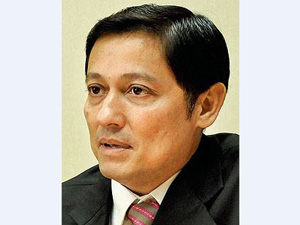



Date:20/09/11
 The Thai government, through the Smart Thailand Strategy, will extend high speed internet coverage to 80 to 85 per cent of all subdistrics in the country within four years to accelerate government services.
The Thai government, through the Smart Thailand Strategy, will extend high speed internet coverage to 80 to 85 per cent of all subdistrics in the country within four years to accelerate government services.
Capt Anudith Nakornthap (pictured), minister of Information and Communication Technology (MICT) Group said pilot provinces would be selected to upgrade government services using high speed internet.
He said the ministry would meet with the concerned agencies including the ministries of public health and interior on database development and applications in two months and pilot provinces would be named afterwards.
The ICT Ministry will support electronic services in four aspects, including 1) e-Government such as e-ID card, e-citizen registration, 2) e-Education such as e-learning via high-speed internet, 3) e-Health such as e-public health services and 4) e-Agriculture such as e-services on agriculture.
The minister said the public would begin to make use of the new government services within one year before the services extend nationwide in four years.
Currently, the internet network covers only 37 per cent of the country. The ministry planned to expand it to cover 80 per cent of all subdistricts by 2012 and up to 85 per cent by 2015.
Jirawan Boonperm, Permanent Secretary of the MICT, told FutureGov Asia Pacific early this year that by 2020, the government wants to see 90 per cent of the population with access to broadband.
“Thailand’s broadband service development is still low. In the long run, it will impact the competitiveness of Thailand,” she said.
Thailand to increase internet coverage up to 85 per cent
 The Thai government, through the Smart Thailand Strategy, will extend high speed internet coverage to 80 to 85 per cent of all subdistrics in the country within four years to accelerate government services.
The Thai government, through the Smart Thailand Strategy, will extend high speed internet coverage to 80 to 85 per cent of all subdistrics in the country within four years to accelerate government services. Capt Anudith Nakornthap (pictured), minister of Information and Communication Technology (MICT) Group said pilot provinces would be selected to upgrade government services using high speed internet.
He said the ministry would meet with the concerned agencies including the ministries of public health and interior on database development and applications in two months and pilot provinces would be named afterwards.
The ICT Ministry will support electronic services in four aspects, including 1) e-Government such as e-ID card, e-citizen registration, 2) e-Education such as e-learning via high-speed internet, 3) e-Health such as e-public health services and 4) e-Agriculture such as e-services on agriculture.
The minister said the public would begin to make use of the new government services within one year before the services extend nationwide in four years.
Currently, the internet network covers only 37 per cent of the country. The ministry planned to expand it to cover 80 per cent of all subdistricts by 2012 and up to 85 per cent by 2015.
Jirawan Boonperm, Permanent Secretary of the MICT, told FutureGov Asia Pacific early this year that by 2020, the government wants to see 90 per cent of the population with access to broadband.
“Thailand’s broadband service development is still low. In the long run, it will impact the competitiveness of Thailand,” she said.
Views: 1033
©ictnews.az. All rights reserved.Similar news
- 24% of U.S. Adults have made phone calls on the Internet
- UNESCO puts sustainable learning online
- Australia gives incentives for the use of telehealth
- US launches computer programme for poor kids
- UN declares web access as human right
- Facebook growth slows in stalkerbase heartlands
- One Third of Millionaires Use Social Media
- Facebook Seeks Bigger Role in Software for Mobile Apps
- Icann increases web domain suffixes
- IBM launches new social networking platform for enterprises
- Google Notches One Billion Unique Visitors Per Month
- Internet providers cut international channel renting costs by 60%
- Azerbaijan launches standard time on internet
- Icann launches facility to ease DNSSec adoption
- Social network data mining yields worrying results for traditional media





















